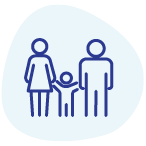There is a shortage of foster carers in the Hunter region with so many children and young people needing a place to live. Can you provide a safe loving home for a child in need?


They come from all walks of life, all ages, and come from different cultural backgrounds. However, most come from complicated family backgrounds or situations where they may have experienced neglect, abuse, or trauma.
The importance of foster carers in our community cannot be underestimated. Being a foster carer is no ordinary role; it comes with a range of responsibilities, and each day can bring new challenges, life-changing experiences and great rewards.
Start your journey by completing our self-assessment tool/enquiry form.
Someone from our team will give you a call. We will then catch up and fill out some paperwork together.
We will finalise your application and discuss some training options.
Once you have completed training there will be an assessment process that will help match you with a child or young person looking for a home.


There is no perfect formula for being a foster carer. Everyone is different and brings unique experiences to this important role. We welcome applications from people regardless of their gender, culture, ethnic and religious backgrounds. Young or old, with or without children, married or single, foster carers come from all parts of our community.
A child can be placed in care for a night, a week, several months or until they are ready to become an independent adult. The length of time a child stays with a carer is determined individually, according to their best interests.
Carers are encouraged to choose the type of care that fits in with their life and family. CatholicCare also has a comprehensive process to find the best match for children with a family, and you are an active participant in that journey.

This type of care is more permanent, lasting longer than two years, and usually when restoration with the family is not possible. When a child or young person is on a long-term care permanency pathway other permanency goals can be explored such as restoration, guardianship or adoption.

This is when a child or young person lives with other family members or someone they already know, such as a grandmother or family friend. This is the preferred option when it is in the child or young person’s best interest, and where the child or young person is unable to be restored to their parents.

Also known as crisis care, this type of short-term care is provided to children or young people who need an urgent place to stay because there are concerns for their imminent safety.

This is short-term care provided to children or young people with the intention of giving their regular carers a reprieve from caring duties.

This type of care can last anywhere from a few months to two years, and usually takes place while restoration with the child’s family is being explored.
FAQs
You can contact our team by emailing fostercare@catholiccare.org.au or calling 1300 590 898.
From the point of enquiry to accreditation as a foster carer, the process can take anywhere between 4 to 12 months.
The process includes the following:
This will be followed by a careful matching process.
No, it doesn’t matter whether you rent or own your own home or whether you live in a house or an apartment. Your house must be safe and suitable for children, with adequate privacy and a spare bedroom for a child or young person.
This depends on the type of foster care you wish to undertake, and the needs of the child or young person being placed with you. We have carers who work full-time, part-time or not at all.
Yes, absolutely. You do not need to have had your own children. Experience with children or young people is helpful however it is not essential.
CatholicCare Social Services Hunter Manning provides a tax-free allowance to support the day-to-day needs of the child or young person in your care. The child or young person also has access to a case plan budget that further supports their additional needs.
As a foster carer with CatholicCare Social Services Hunter Manning you will receive the following:
Yes. Once you are approved as a foster carer, CatholicCare Social Services Hunter Manning will let you know the details of who you are able to care for.
CatholicCare Social Services Hunter Manning will approach you when there are children or young people that need a home, provide you with the information we have, and you can say yes or no.
Matching a child or young person with a foster carer is dependent upon good assessments, clear support plans, careful decision making and a high level of collaboration and information sharing between the CatholicCare Social Services Hunter Manning Care Team, of which our foster carers form a valued and respected part of.
Yes, contact between children and young people and their birth family is important for children’s emotional and psychological wellbeing and their sense of identity. However, all our carers receive support in relation to birth family contact with a strong focus on achieving better outcomes for children and young people.
Throughout Newcastle, Lake Macquarie, Maitland, the Upper Hunter and Manning, CatholicCare offers support, assistance and education to all families and individuals, regardless of age, gender or religion.
CatholicCare acknowledges the traditional custodians of the land, sea and water ways on which the Diocese is located – Awabakal, Biripi, Darkinjung, Kamilaroi, Wiradjuri, Worimi, Wonnarua. We commit to the ongoing journey of Reconciliation.
© CatholicCare 2023